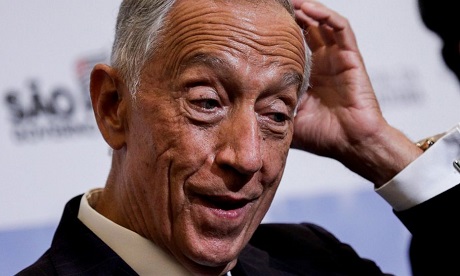Portugal’s president is under fire for seeming to make light Catholic clergy sex abuse revelations.
After finding members of the Portuguese Catholic Church had sexually abused over 400 children, President Marcelo Rebelo de Sousa indicated the number didn’t seem significant.
“Having 400 cases doesn’t seem to me to be a lot, because in other countries investigating shorter time periods there were thousands of cases,” he said.
The President’s remark has drawn widespread criticism. Some critics accuse him of lacking compassion.
Several hours after making the comments, a statement on the President’s website sought to explain what his remark meant.
President de Sousa “regrets that not more people have come forward, because the total so far doesn’t seem particularly high considering the probable sad truth, both in Portugal and in the rest of the world,” the website reported.
The President wants investigations to continue and any evidence sent to the attorney general’s office, the post continued.
Fallout from de Sousa’s initial statement is still causing ructions, involving late night live interviews with two national broadcasters. He made it clear on both these occasions that the cases are “very serious.”
Prime Minister Antonio Costa has come to the President’s aid, explaining the President’s initial comments had been misinterpreted.
Meanwhile, the Church investigating committee, which started work last January, is still urging victims to come forward.
Pedro Strecht, a psychiatrist who heads Portugal’s Independent Committee for the Study of Child Abuse in the Catholic Church, said his panel has compiled a list of 424 alleged victims.
Before the committee started its work, senior church officials claimed there had only been a handful of abuse cases.
The panel, which was created by the Portuguese Bishops Conference, is looking into alleged abuse cases from 1950 to the present involving minors aged two to 17.
It is due to publish a report on 31 January 2023.
So far indications are that “a significant number” of Catholic Church priests and members have allegedly committed sex abuses.
“The problem not only existed, it also became widespread,” Strecht said.
The further back in time his panel went, it found “serious situations that lasted for decades (and) in some places reached truly endemic proportions.”
Some alleged abusers were named by more than one victim. Hundreds of abusers have been identified, Strecht said.
Portugal’s statute of limitations has expired on most of the allegations. However, 17 complaints have been forwarded to the Portuguese attorney general’s office and another 30 may still be sent, Strecht said.
All information about the victims and alleged abusers is being kept under wraps at present.
The panel’s final report will include a confidential annex of all the names of alleged abusers. Copies will be sent to the Portuguese Bishops Conference and the police.
Strecht said the panel had no information about any abuses committed by foreign priests.
All of Portugal’s bishops have been interviewed. Strecht praised the Portuguese Bishops Conference for showing “pioneering courage” in setting up the study.
Source
Additional readingNews category: Great reads, World.




